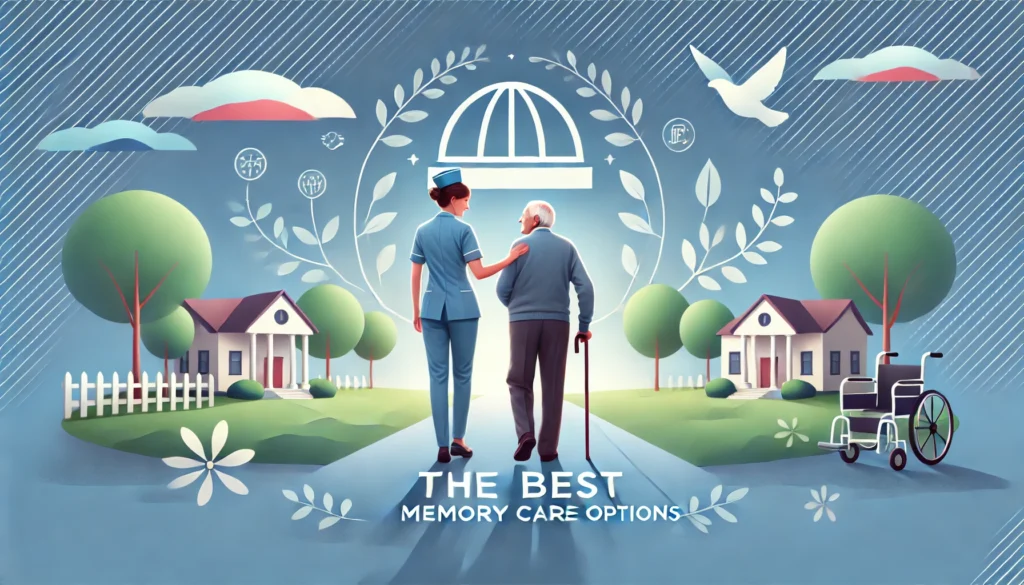Understanding Memory Care and Its Importance
Memory care is a specialized form of long-term care tailored to individuals with Alzheimer’s disease, dementia, and other cognitive impairments. These conditions gradually erode an individual’s ability to perform daily tasks, necessitating specialized support to maintain quality of life. A memory care facility provides structured environments, trained caregivers, and therapies designed to enhance cognitive function while ensuring safety. Unlike standard assisted living, memory care centers focus on mitigating the symptoms of cognitive decline through targeted activities, medication management, and personalized care plans.
You may also like: How Does Memory Change with Age? Understanding Neural Pathway Strengthening in Seniors
The decision to place a loved one in a memory care unit is often fraught with emotional and logistical challenges. Families must navigate various care options, assess the suitability of different facilities, and understand financial and regulatory aspects. Given the complexity of cognitive disorders, finding the right memory care nursing home or assisted living facility is crucial for ensuring a patient receives the best possible support.

Key Features of Memory Care Facilities
The structure of a memory care assisted living facility differs significantly from standard senior living communities. The environment is designed with dementia-friendly architecture, including clear signage, color-coded hallways, and secured exits to prevent wandering—a common concern among dementia patients. Dementia care facilities also provide round-the-clock supervision, ensuring that residents receive continuous medical and emotional support.
One of the hallmarks of dementia assisted living is the emphasis on structured activities that promote cognitive engagement. These can include music therapy, reminiscence therapy, art classes, and sensory stimulation exercises. Care homes for dementia patients aim to slow cognitive decline by fostering a routine and engaging residents in mentally stimulating tasks.

Types of Memory Care Facilities
- Memory Care Units in Nursing Homes: Many nursing homes with dementia units offer memory care services within a broader skilled nursing environment. These units provide a higher level of medical care for individuals with severe cognitive impairments who may also have complex medical needs.
- Assisted Living with Dementia Care: Assisted living facilities that offer specialized memory care programs cater to individuals who require daily assistance but do not need full-time medical supervision. These assisted living for dementia patients communities provide a balance of independence and structured support.
- Standalone Memory Care Centers: Some memory care centers operate independently from nursing homes or assisted living communities. These specialized facilities focus exclusively on Alzheimer’s and dementia care, offering tailored programs to enhance cognitive abilities and emotional well-being.
- Alzheimer Care Facilities: Designed explicitly for individuals with Alzheimer’s disease, these centers focus on managing the unique progression of the condition, incorporating therapies that support memory retention and emotional health.

Choosing the Right Memory Care Facility
Selecting the best memory care facility requires thorough research and careful consideration. Families should evaluate several factors before making a decision:
- Staff Training and Expertise: Qualified caregivers with specialized dementia training are essential for ensuring patients receive proper support. Memory care services should include behavioral management strategies and de-escalation techniques to handle mood swings or aggression common in dementia patients.
- Safety and Security: Facilities for dementia patients must have secure entrances, enclosed outdoor spaces, and 24/7 surveillance to prevent wandering and ensure resident safety.
- Personalized Care Plans: The best memory care programs offer individualized treatment plans, ensuring that each resident receives care tailored to their cognitive abilities, health conditions, and preferences.
- Family Involvement and Communication: Transparency between the facility and family members is vital. Regular updates, scheduled visits, and involvement in care planning foster a supportive environment for both residents and their loved ones.
- Therapeutic and Social Activities: Memory care meaning extends beyond medical supervision; it includes enrichment programs that enhance quality of life. A strong activity calendar with cognitive exercises, social interactions, and creative therapies is a sign of a high-quality facility.
Financial Considerations and Insurance Coverage
Memory care can be a significant financial investment. The cost varies depending on location, level of care, and facility amenities. Families must explore funding options such as:
- Long-Term Care Insurance: Policies may cover some expenses related to assisted living Alzheimer’s care.
- Medicaid and Medicare: While Medicare does not typically cover long-term memory care, Medicaid may assist with costs for eligible individuals.
- Veterans Benefits: Financial aid programs are available for veterans needing memory assisted living services.
- Private Pay and Savings: Many families rely on personal savings, retirement funds, or home equity to finance care.
Frequently Asked Questions (FAQ)
What is memory care, and how does it differ from standard assisted living?
Memory care is a specialized form of long-term care designed for individuals with Alzheimer’s disease, dementia, or other cognitive impairments. Unlike standard assisted living, a memory care facility provides structured environments, enhanced security, and trained staff who understand cognitive decline. Memory care centers often include therapies and activities specifically tailored to maintain cognitive function and slow disease progression. Additionally, memory care units within nursing homes offer higher levels of supervision to ensure residents’ safety and well-being. Choosing between memory care and assisted living depends on the individual’s cognitive and functional needs.
What services are typically provided in a memory care facility?
Memory care services are designed to support residents with cognitive impairments while promoting their independence as much as possible. Services typically include assistance with daily activities such as bathing, dressing, and medication management. Memory care centers also provide cognitive therapies, social engagement programs, and structured routines to enhance memory retention and reduce anxiety. Many dementia care facilities feature secure environments with keypad entry to prevent wandering. Additionally, memory care assisted living facilities often incorporate sensory-based therapies and reminiscence programs to support cognitive function.
How do memory care nursing homes ensure resident safety?
Memory care nursing homes prioritize resident safety by implementing multiple layers of security and specialized staff training. They often feature secured doors, monitored exits, and enclosed outdoor spaces to prevent wandering. Staff members are trained to handle behavioral challenges associated with dementia, such as agitation and confusion. Additionally, memory care units utilize technology, such as motion sensors and wearable GPS devices, to track residents’ movements and reduce fall risks. A memory care nursing home also employs emergency response protocols to ensure swift action in case of a medical or behavioral crisis.
Is memory care considered skilled nursing, or is it different?
Memory care and skilled nursing are related but serve different purposes. A memory care facility focuses on structured cognitive support and specialized dementia care within a secure environment. Skilled nursing with memory care, on the other hand, offers medical services, rehabilitation, and round-the-clock nursing care for individuals with complex medical conditions in addition to cognitive impairments. Families should assess whether their loved one requires dementia-focused support or more intensive medical supervision when choosing between the two options. Some facilities combine memory care and skilled nursing, providing a continuum of care as a resident’s needs evolve.
What should families look for in a memory care center?
Families should evaluate several factors when choosing a memory care center to ensure it meets their loved one’s needs. Key considerations include staff-to-resident ratio, specialized dementia training for caregivers, and available therapies and programs. The physical layout should promote safety while allowing freedom of movement, with clear signage and secure outdoor areas. Memory care centers should also provide individualized care plans that accommodate the resident’s unique cognitive and physical needs. Lastly, transparency regarding costs, medical oversight, and family involvement policies is essential when selecting the right memory care facility.
How do memory care programs enhance quality of life for residents?
Memory care programs use structured activities and therapies to maintain cognitive function and encourage social engagement. Programs often include music therapy, art therapy, and sensory stimulation to help residents connect with past memories and reduce anxiety. Assisted living for dementia patients incorporates routine-based schedules to minimize confusion and improve emotional well-being. Additionally, many facilities for dementia patients offer exercise programs that enhance mobility and prevent physical decline. The goal of memory care programs is to create a sense of purpose and belonging for residents while providing compassionate care.
What are the differences between dementia care facilities and Alzheimer’s care facilities?
While dementia care facilities and Alzheimer’s care facilities provide similar support, the key difference lies in specialization. Dementia assisted living facilities cater to residents with various types of cognitive decline, including vascular dementia, Lewy body dementia, and frontotemporal dementia. Alzheimer’s care facilities, on the other hand, specifically focus on individuals diagnosed with Alzheimer’s disease and often provide therapies targeted at slowing its progression. Care homes for dementia patients generally offer a broader approach to cognitive care, whereas Alzheimer’s assisted living facilities may implement advanced research-based interventions for Alzheimer’s patients.
Are memory care assisted living facilities more expensive than standard assisted living?
Yes, memory care assisted living facilities typically cost more than standard assisted living due to the specialized care, security measures, and trained staff required. The additional cost covers 24/7 supervision, cognitive therapies, and safety features such as secured exits and wander management systems. However, pricing varies depending on the facility’s location, level of care, and available amenities. Some assisted living facilities for dementia patients offer tiered pricing based on the level of assistance required. Families should research financial assistance options, such as Medicaid or long-term care insurance, to help cover costs.
What role do nursing homes with dementia units play in long-term care?
Nursing homes with dementia units provide both medical and cognitive support for residents with advanced dementia. These units operate within skilled nursing facilities and offer round-the-clock medical supervision alongside memory-focused activities. Assisted living with dementia care may be suitable for those with moderate cognitive decline, while dementia nursing homes cater to individuals with more severe impairments. These facilities employ specialized caregivers trained to handle behavioral challenges and provide palliative care when needed. Families should consider a dementia nursing home if their loved one requires medical attention beyond what a standard memory care center can offer.
How can families stay involved in their loved one’s care within a memory care unit?
Family involvement is crucial in maintaining a resident’s emotional well-being and continuity of care in a memory care unit. Many care homes for dementia sufferers encourage family participation through structured visits, support groups, and care planning meetings. Memory care facilities often use digital platforms to provide updates on residents’ health, activities, and progress. Additionally, families can participate in memory care programs, such as storytelling sessions or meal-sharing events, to create meaningful connections. Open communication with staff ensures that the resident’s evolving needs are met, making assisted living Alzheimer’s facilities more personalized and supportive.
Conclusion: Ensuring the Best Care for Your Loved One
Choosing the right care home for dementia is a deeply personal and impactful decision. By considering factors such as facility structure, caregiver qualifications, security measures, and therapy programs, families can ensure that their loved ones receive the highest standard of care. Care homes for dementia sufferers should not only provide safety and medical supervision but also create an enriching, supportive environment that promotes dignity and well-being.
memory loss support, cognitive impairment care, senior dementia housing, Alzheimer’s disease treatment, elderly cognitive health, dementia therapy programs, neurodegenerative disease care, cognitive wellness centers, aging brain support, neurological rehabilitation, brain health services, senior cognitive therapies, long-term Alzheimer’s care, dementia-friendly communities, assisted living for cognitive decline, mental acuity support, neurocognitive disorder care, elderly memory retention, progressive dementia treatment, senior cognitive enrichment
Further Reading:
10 Questions to Ask When Considering a Memory Care Community
Choosing the Right Memory Care Service: A Step-by-Step Guide for Families
Choosing a Memory Care Facility: 10 Tips and an Essential Checklist of Questions
.Important Note: The information contained in this article is for general informational purposes only, and should not be construed as health or medical advice, nor is it intended to diagnose, prevent, treat, or cure any disease or health condition. Before embarking on any diet, fitness regimen, or program of nutritional supplementation, it is advisable to consult your healthcare professional in order to determine its safety and probable efficacy in terms of your individual state of health.
Regarding Nutritional Supplements Or Other Non-Prescription Health Products: If any nutritional supplements or other non-prescription health products are mentioned in the foregoing article, any claims or statements made about them have not been evaluated by the U.S. Food and Drug Administration, and such nutritional supplements or other health products are not intended to diagnose, treat, cure, or prevent any disease.


